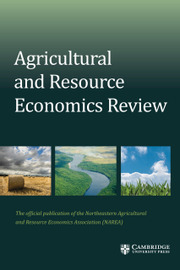Article contents
Sustainability Science: A Call to Collaborative Action
Published online by Cambridge University Press: 15 September 2016
Abstract
Sustainability science is an emerging field directed at advancing sustainable development. Informed by recent scholarship and institutional experiments, we identify key roles for economists and encourage their greater participation in this research. Our call to collaborative action comes from positive experiences with the Sustainability Solutions Initiative based at the University of Maine, where economists collaborate with other experts and diverse stakeholders on real-world problems involving interactions between natural and human systems. We articulate a mutually beneficial setting where economists’ methods, skills, and norms add value to the problem-focused, interdisciplinary research of sustainability science and where resources, opportunities, and challenges from science bolster economic research specifically and land/sea grant institutions broadly.
Keywords
- Type
- Invited Papers
- Information
- Copyright
- Copyright © 2013 Northeastern Agricultural and Resource Economics Association
References
- 9
- Cited by


